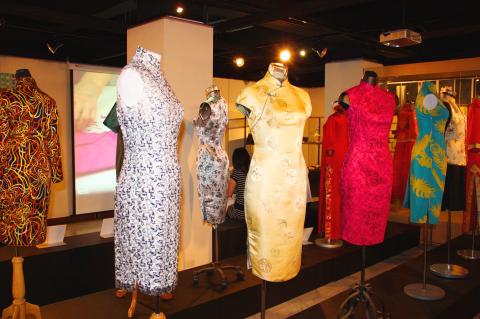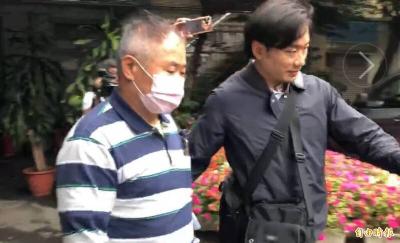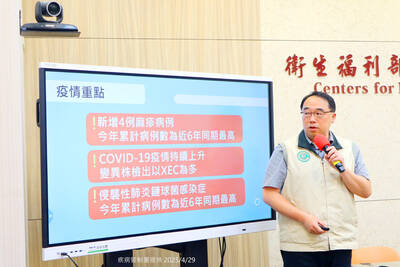A special exhibition at the Chinese Clothing and Culture Center of Fu Jen Catholic University’s department of textiles and clothing opened on Wednesday showcasing an array of qipaos and Chinese-style clothing made by Sister Teresa Fung (馮綺文) over the years.
The 80-year-old Fung became interested in embroidery and tailoring from a young age and has studied the qipao style of clothing her whole life. One of her goals, she says, was to continue to promote teaching how to make the garment.
“Preserve the tradition while bravely trying innovation” is the motto she uses for herself and her students, Fung said from her classroom, as she taught students ironing techniques in Mandarin spoken with a heavy Guangzhou accent.

Photo: Tsai Pai-ling, Taipei Times
Fung was born in Guangzhou in 1931 and learned how to sew and tailor clothes for dolls from the age of four. When World War II erupted, she went to Hong Kong, and later, using money given to her by her mother after the war, she bought her first sewing machine, thus making her first step into what would become her life’s work.
Hardworking and eager to learn, Fung rose quickly in the industry and became head of the children’s clothing department at the renowned Green House company at the age of 16.
She later founded a clothing company with some friends and even made a seven-colored petticoat that quickly became a hot fashion item.
Although Fung later joined a convent and became a nun, she never abandoned tailoring. With the support of her convent, she started the St Gabriel’s Tailoring School and was sent to Taiwan in 1979 to teach local nuns how to sew convent clothing.
She started teaching at Fu Jen by 1980 and in the 30 years since then she has passed down her skills to the younger generation.
Fung said she was thankful that God had granted her deft hands to design classically beautiful clothing despite her lack of education. She said that sewing form-fitting qipaos required great attention to detail and that one could not skimp on any of the steps in the process, from observing the body and taking measurements to drawing the design and sewing.
The exposition has 20 different styles of qipaos on display, taking visitors on a trip through modern Chinese fashion history all the way to Shanghai in the 1930s and 1940s.
The exhibition runs through June 18 at the Chinese Clothing and Culture Center in the Chao Yun Building, from 10am to 4pm Monday through Friday. Admission is free.
TRANSLATED BY JACK CHUNG, STAFF WRITER

A fugitive in a suspected cosmetic surgery fraud case today returned to Taiwan from Canada, after being wanted for six years. Internet celebrity Su Chen-tuan (蘇陳端), known as Lady Nai Nai (貴婦奈奈), and her former boyfriend, plastic surgeon Paul Huang (黃博健), allegedly defrauded clients and friends of about NT$1 billion (US$30.66 million). Su was put on a wanted list in 2019 when she lived in Toronto, Canada, after failing to respond to subpoenas and arrest warrants from the Taipei District Prosecutors’ Office. Su arrived at Taiwan Taoyuan International Airport at 5am today on an EVA Air flight accompanied by a

A 79-year-old woman died today after being struck by a train at a level crossing in Taoyuan, police said. The woman, identified by her surname Wang (王), crossed the tracks even though the barriers were down in Jhongli District’s (中壢) Neili (內壢) area, the Taoyuan Branch of the Railway Police Bureau said. Surveillance footage showed that the railway barriers were lowered when Wang entered the crossing, but why she ventured onto the track remains under investigation, the police said. Police said they received a report of an incident at 6:41am involving local train No. 2133 that was heading from Keelung to Chiayi City. Investigators

The Keelung District Prosecutors’ Office today requested that a court detain three individuals, including Keelung Department of Civil Affairs Director Chang Yuan-hsiang (張淵翔), in connection with an investigation into forged signatures used in recall campaigns. Chang is suspected of accessing a household registration system to assist with recall campaigns targeting Democratic Progressive Party (DPP) city councilors Cheng Wen-ting (鄭文婷) and Jiho Chang (張之豪), prosecutors said. Prosecutors yesterday directed investigators to search six locations, including the Chinese Nationalist Party’s (KMT) Keelung office and the residences of several recall campaign leaders. The recall campaign leaders, including Chi Wen-chuan (紀文荃), Yu Cheng-i (游正義) and Hsu Shao-yeh

COVID-19 infections have climbed for three consecutive weeks and are likely to reach another peak between next month and June, the Centers for Disease Control (CDC) said yesterday. Weekly hospital visits for the disease increased by 19 percent from the previous week, CDC Epidemic Intelligence Center Director Guo Hung-wei (郭宏偉) said. From Tuesday last week to yesterday, 21 cases of severe COVID-19 and seven deaths were confirmed, and from Sept. 1 last year to yesterday, there were 600 cases and 129 deaths, he said. From Oct. 1 last year to yesterday, 95.9 percent of the severe cases and 96.7 percent of the deaths